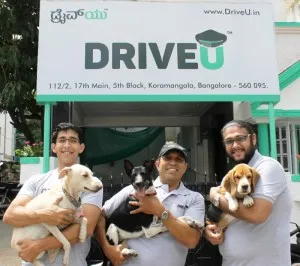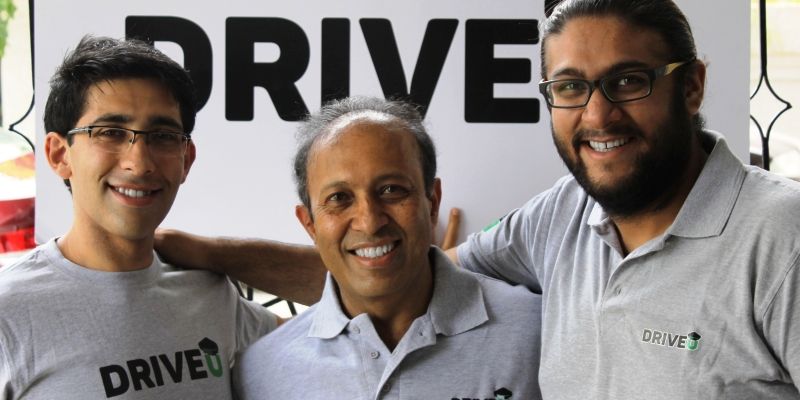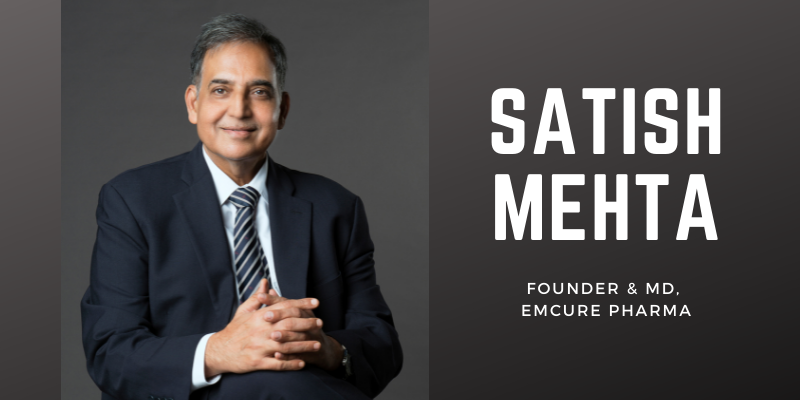Ex-TaxiForSure, FreeCharge executives bet on creating a new category to 'DriveU' with on-demand drivers
How awesome it would be if you were greeted by three adorable dogs when you visited an office! That's exactly what you should expect when visiting the humble 2000 square feet office of Humble Mobile Solutions Pvt. Ltd, a one month old startup nestled in one of the many by-lanes of Koramangala.
What is DriveU and how does it work?
Started by Ramprasad (Rahm) Shastry, Ashok Shastry and Amulmeet Singh Chadha, Humble Mobile Solutions Pvt. Ltd is the parent company behind the new on-demand service app in town - DriveU. With DriveU (currently available on the Android Play Store), owners of private vehicles can ask for a driver at the touch of a button. Once you have set your location and time, the app assigns a driver to you. You can track the assigned driver in real-time. When the driver reaches the assigned location, you hand over the car keys and he drives you to your destination. During the ride, you can keep a track of the fare. Fares start at Rs 89 per hour. Once you've reached the destination, stop the ride and pay within the app (cashless) or in cash. You can give ratings to the driver, and share feedback on the service.
The co-founders claim that theirs is the first app aggregator for drivers in India.

The team and the story behind starting up
The co-founding trio comes with backgrounds in operations, product and building/selling companies. Rahm Shastry, the CEO, was one of the early investors in TaxiForSure. After TFS was bought by Ola for $200 million earlier this year, his son Ashok Shastry (COO, DriveU) who worked in the marketing team at TaxiForSure called him to say that he was going to start a company. Ashok initially thought of building a startup that would provide customers on-demand valet services. He even went ahead and hired a team to do the parking. But they soon realized that they were catering to a very small market and not even solving the real problem. They immediately pivoted to the current model of on-demand drivers.
DriveU’s third co-founder Amulmeet Singh Chadha (CPO, DriveU), who comes with a work-experience comprising Zipdial and senior product management roles at RedBus, and most recently FreeCharge, joined them after a meeting over coffee with Ashok. Rahm soon decided to come back to India and head the company as Chief Executive.
Use cases for DriveU
"Think of a person who has a vehicle, and on a particular day he wants to finish an important presentation on the morning of his meeting. He can just call a driver and utilize the ride-time to finish it," Ashok tells us about one of the use-cases.
"Or think of a situation where you have to drop your parents off to the airport in the morning, but you don't want to miss office. You can just call a driver, have him drop off your parents to the airport and return the car to your workplace," Rahm suggests another use-case.
It's early days yet for the startup and with each passing day they come across new use-cases. The team hopes to zero down on a few major use-cases and tailor the product to suit them. For example, the app would be mighty useful on Friday and Saturday nights in Bengaluru as many vehicle owners find themselves incapable of driving after partying hard.
Driver on-boarding
Most of DriveU's first set of 50 drivers are coming from driver operators. The drivers are first screened, taken through a rigorous background verification process, and are trained by the team to adhere to the processes set out. The team has currently on-boarded drivers with 4-5 years of experience. They are then given a behavior training that ranges from how to talk to customers, restricting mobile-phone usage while driving, to slowing down over speed-bumps.
For taxi-hailing services like Ola and Uber, the biggest impediment to growth is the demand side of the equation. There aren't enough professional drivers who have their own vehicles. Hence, these companies aggressively push lucrative EMI, down-payment offers to these drivers to get their own vehicles.
"It's an aspirational shift. Someone who has just learnt how to drive will not go ahead and buy their own car. They'll start with driving for someone else," says Amulmeet about the set of drivers DriveU is looking at. Apart from driver operators, the team is also looking at independent professionals who are looking at generating revenues part-time.
Valued service and value-added services
With DriveU, the team's intention is to accord the same kind of experience to the customer that they would get with a full-time private driver. Amulmeet is betting on the product to do exactly that.
"On the product side, we want to get to a point where the entire experience is personalized to your habits and that we serve a consistent and loyal experience each time."
Apart from taking care of your parking woes, the driver can also provide a few add-on services while the trip is on, and the driver is idle. So, for example, while the customer is enjoying a dinner with their family, the driver can get the car re-fueled, or washed, check the air pressure in the tyres and even get the brake-oil changed for you.

Driver side of the equation
The driver is able to see at his end the location where he needs to reach and at what time. DriveU has trained the drivers to only call the customer when it is close to the assigned time and not before. The uniformed driver turns up with a DriveU backpack that has a footmat and a seat cover to ensure that the customer's car is clean and tidy when he leaves after the trip.
"We equip our drivers to ensure that they deliver a 5-star quality service
Once the trip ends the driver then takes up the next ride assigned to him, ideally within a two kilometer range. The driver can walk, use public transportation or an auto-rickshaw to reach his new location. The team is working on a system of 'runners' (on bikes) that could be deployed in the city to take a driver from one location to the other.
Six months from now
With all the ride data that DriveU will collect over the next six months, it is confident of scaling up and matching the supply-demand equation to the extent that drivers are available within two kilometers of the customer's location. Down the road, the team aims to build a sharing economy to enable bulk-bookings for shared rides to work and back on weekdays.
Related read: How carpooling became a hot new social trend in India
"We are already doing almost 100 rides per week in Bengaluru, and hope to reach 500-1000 rides per day in the city by the end of the year," says Rahm.
Over a period of time, the app will be able to bring in consistency in the experience, by allowing customers to feed in their most frequented addresses. "Once we have the addresses, you need not give the driver detailed directions the next time you take a ride with us. Your instruction would be something like, 'take me to my uncle's place' or 'take me to the Tennis club'," adds Rahm.
The startup is currently funded by the CEO and will look to raise funds soon.
Competition
DriveU's competitors are smaller driver operators.
"We are the only ones with a mobile app. We are on-demand and our pricing is transparent," Amulmeet differentiates DriveU.
The biggest differentiation, though, may be in the scalability that mobile technology brings into the fold. The driver operators, on the other hand, have more lifestyle-oriented business and really don't have scalability as their priority.
"There are at least 150 driver operators in Bengaluru with an average of 50 drivers each. This brings the total number of professional drivers in Bengaluru to 7500," Rahm gives us the statistics that DriveU figured from their survey.

A love for dogs
If one doesn't get a chance to visit DriveU's office and see the dogs, their business cards make it obvious. The designations of the three co-founders read -- CEO & Dog Lover, CPO & Dog Lover and COO & Dog Lover. Three dogs are free to roam about in the startup's office. In the same vein, the team is doing something for other dogs as well.
"We have pledged to donate 1% of our revenue from the get-go to CUPA, a public charitable trust for the welfare of animals," says Rahm.
YourStory's take
Opportunity -- Car ownership in India is currently at 13 per 1000 people. It is expected to increase upto 6x in the years to come. With increased car ownership and the infrastructure to support it not growing at the same pace, traffic problems will only worsen. For the car owners, this would mean more time stuck in traffic. Thus, the entry of DriveU seems opportune now.
Challenges -- DriveU is trying to be a category-creator -- think of companies like FreeCharge and Mu Sigma, category creators in their own right. On top of that, it is a 'Habit Forming Company' which means it is trying to change the way people are wired to function. The startup's work is cut out - it's an uphill task. But what stands out at DriveU is the team. With the combined expertise of operations knowledge coming in from TaxiForSure and the product knowledge from FreeCharge and RedBus, the startup has the ability to take a shot at organizing the driver market in India.
Once the startup figures out (in the next 6 months) its top use-cases from among the scattered ones right now, scaling the business should become easier.
Website | App | Facebook page
You'll also love to read: How taxi aggregators like Ola and Uber are bringing micro-entrepreneurship to students











